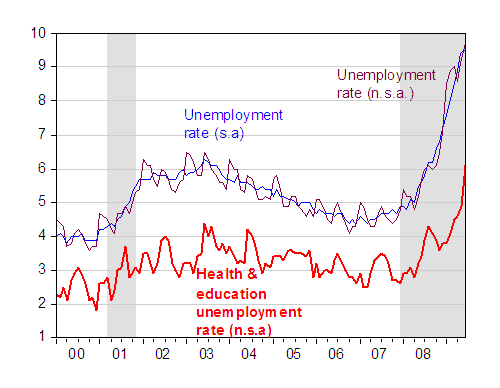Casey Mulligan rebuts my post asserting slack in the economy by posing the scenario “Construction Workers Teaching Kindergarten“. He writes:
Econbrowser now claims* that the stimulus bill can be effective, because unemployment rates are high (whatever that means) in health care and education. Let’s take a look at employment changes Dec 2007 – June 2009 (millions) by industry:
Total nonfarm payrolls: -6.5
Construction: -1.3
Manufacturering: -1.9
Education and Health: +0.7
How exactly is fiscal policy going to create 3.5 million jobs by primarily hiring people in education and health? I see only two scenarios, both absurd and/or dishonest:
He argues these two scenarios are: (1) “The construction workers become kindergarten teachers” or (2) “The people in construction and manufacturing stay unemployed.”
Are Unemployment Statistics Meaningless?
Professor Mulligan apparently disbelieves unemployment rates, preferring to ascribe greater importance to employment figures. I think I understand why he does, given the optimizing theoretical framework he works with (see his interpretation of recent employment trends here). For those of us who believe that there is some information regarding involuntary unemployment in the unemployment series that BLS collects, here’s what the aggregate unemployment and the health and education unemployment series look like.

Figure 1: Unemployment rate for total noninstitutional labor force (blue for seasonally adjusted, dark blue of not seasonally adjusted), and unemployment rate for health and education services, not seasonally adjusted (red). Gray shaded areas denote NBER defined recession dates. Sources: BLS June emloyment situation report – household survey, and NBER.
The unemployment rate in health and education services has risen only (!) 3.5 percentage points, compared to 4.9 percentage points for the civilian labor force, from 2007M12 to 2009M06 (both series nsa), so I agree that the deterioration in this particular sector’s condition is not as bad as the overall economy’s. But that doesn’t deny the fact that there is some slack in the health and education sector (unless of course you disbelieve the unemployment figures entirely).
Are Spillover Effects Zero?
It’s true that if the additional job retained by a teacher has zero spillover impact on the rest of the economy, then Professor Mulligan’s argument that 3.5 million jobs will not be created makes sense. But I think it’s plausible to argue that if the teacher retains her job, keeps her house (thereby removing additional downward pressure on housing prices and keeps the house off the inventory of unsold houses), consumes more than she would have if she’d lost her job, and saves income she wouldn’t have otherwise received in the form of equities (thereby putting upward pressure on asset prices, reducing the cost of capital to the economy, etc.), additional jobs will be created.
Even if you want to rule out a priori all those general equilibrium effects, and just focus in on employment, as long as there is some Keynesian multiplier effect, then some of the employment effect occurs outside of education and health. After all, doctors don’t consume just medical services…at least in the world I live in.
People are free to believe whatever estimate of the Keynesian multiplier they want to, but it’s clear that the argument posed by Professor Mulligan requires no multiplier process. For surveys of estimates (rather than just my own preferred point estimate), see: [1], [2], [3].
On the other hand, I do agree that the stimulus package could have been better crafted; in particular, more for infrastructure and more transfers to the states would have been preferable [4].
* To be correct, it’s just myself that asserted in this post that the stimulus bill could be effective.
Are Unemployment Statistics Meaningless? Are Spillover Effects Zero?
Disclaimer: This page contains affiliate links. If you choose to make a purchase after clicking a link, we may receive a commission at no additional cost to you. Thank you for your support!


Leave a Reply